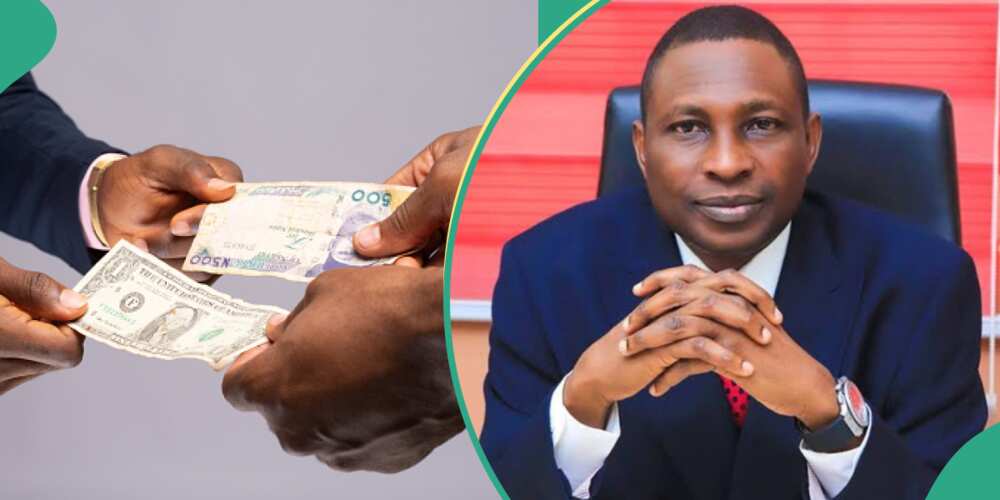“Charge for Service in Dollars and Go to Jail”: EFCC Issues Stern Warning to Schools, Hotels, Others
- The EFCC has issued a stern warning to Nigerians in its move to strengthen the nation's currency, naira
- The anti-graft agency ordered that all business transactions must be done in naira and not in dollars
- This recent decision has been greeted with mixed reactions from Nigerians on social media as they urged the EFCC to go after politicians and celebrities
PAY ATTENTION: The 2024 Business Leaders Awards Present Entrepreneurs that Change Nigeria for the Better. Check out their Stories!
Legit.ng journalist Esther Odili has over two years of experience covering political parties and movements.
The Economic and Financial Crimes Commission (EFCC) has warned Nigerians against the use of Dollars or any foreign currency for services in the country.

Source: Twitter
What will happen to anyone caught doing transactions in dollars?
The chairman of the EFCC, Ola Olukoyede’s strong warning is contained in the latest edition of the agency’s publication called EFCC Alert, made available to newsmen on Monday, April 8.

Read also
"Price war will begin": Minister announces date Emirates Airlines will resume operations in Nigeria
As reported by Vanguard, Olukoyede said that anyone caught collecting charges for services or goods would be treated as a criminal in accordance with relevant Nigerian laws.
The EFCC chairman said:
“We have also started securing convictions. Also on the dollarisation of our economy, invoicing in dollar, schools that charge Nigerians in dollar, supermarkets that trade in dollar, estate developers that sell their properties in dollar, hotels that are invoicing in dollar, we are coming after you and we have made arrests in that area.
"Yes, if foreigners are coming in and the only means of transacting is their credit card, and dollar, why not, you will get that, but document it properly as against selling things within the system, local economy and you will be using dollar as the medium of exchange, it is illegal. Our law does not allow for that. And we have also effected some arrest. This is making impact as the rate at which some people advertise goods and services in dollar has really gone down,” the chairman stated.
Olukoyede, who also spoke on how the agency under him is driving the anti-graft war, flayed Nigerians who continue to celebrate criminals in the country, arguing that such practice was anti-societal.
Nigerians react to EFCC's warning against the use of dollars
As usual, Nigerians took to the comment section on X and reacted to EFCC's warning against the use of dollars for business transactions in Nigeria. Legit.ng captured some of their reactions below.
@BigCrude tweeted:
"Why is everything in Nigeria By force? Simple policy will sort all these."
@Melebroz1 tweeted:
"I hope the American university in Nigeria is no longer accepting school fees in dollars."
@sundaypeter8110 tweeted:
"Tell our politicians and celebrities simple."
@mr_stitch01
"Jail go too full."
@samuel_olutayo tweeted:
"Nonsense! People can charge for services in whatever currencies they like. Warn our government to stop borrowing in dollars and let's come back to talk."
@Vincentonyeka90 tweeted:
"Go after politicians and customs."
@koko_cle tweeted:
"Go and arrest some private school owners in Abuja first."
Naira ranks among best-performing African currencies
Legit.ng earlier reported that African markets.com, a regional research hub, has named the naira the third best-performing currency on the continent.
This is as the CBN's determined efforts have caused the naira to rise from its lowest level this year.
Increasing interest rates and selling dollars straight to foreign currency markets are two examples of these moves.
PAY ATTENTION: Unlock the best of Legit.ng on Pinterest! Subscribe now and get your daily inspiration!
Source: Legit.ng


